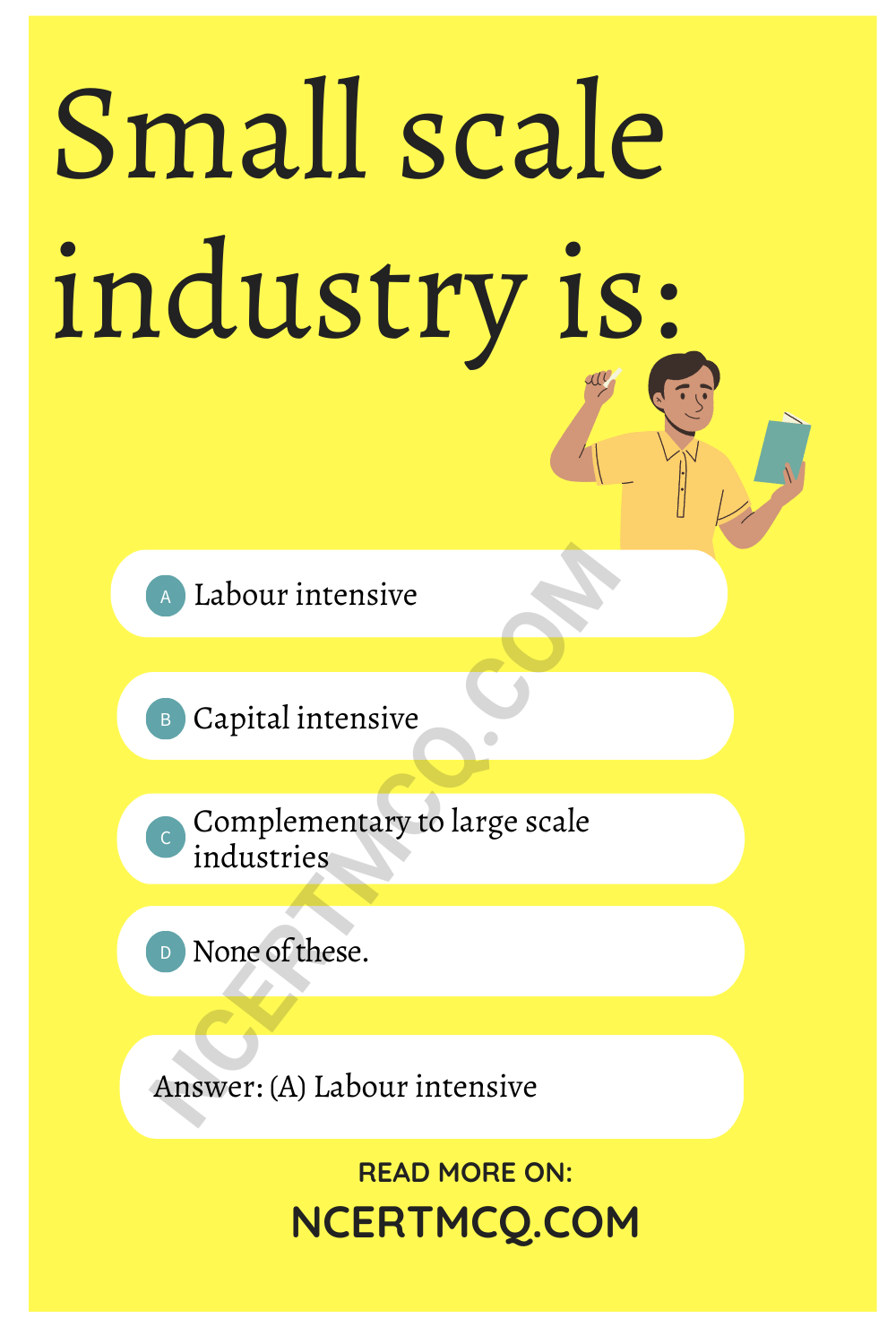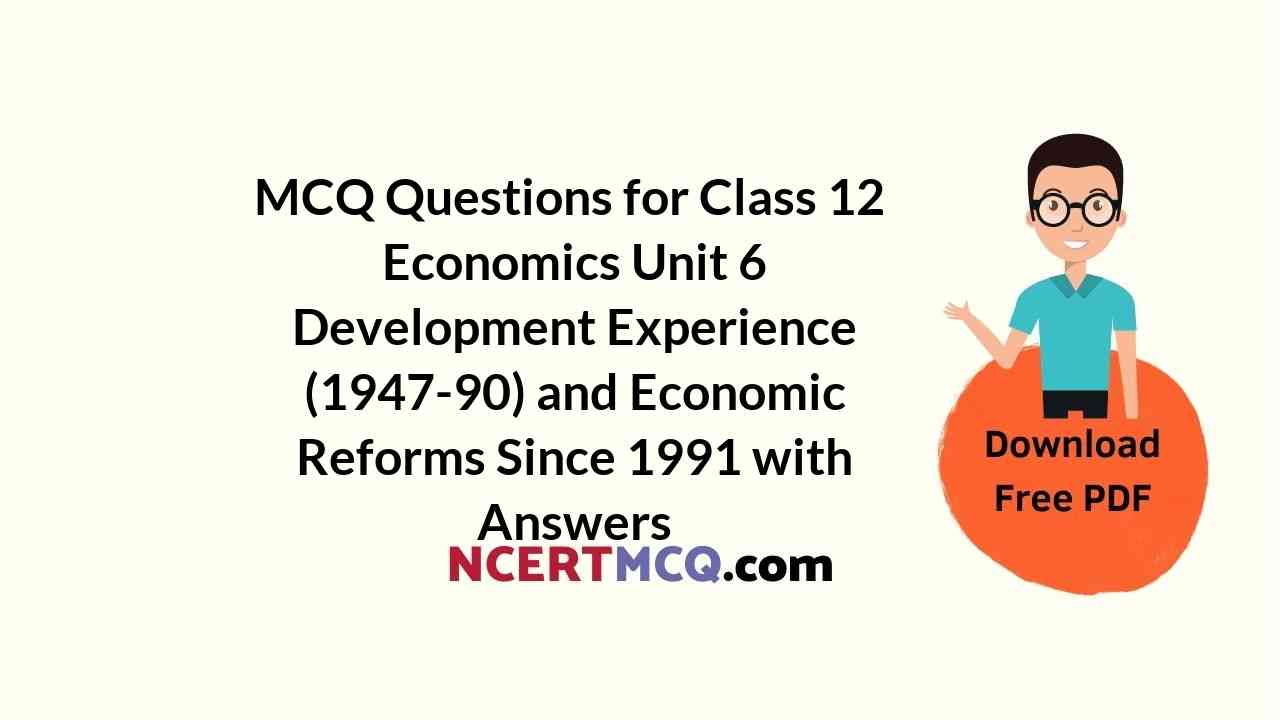Check the below NCERT MCQ Questions for Class 12 Economics Unit 6 Development Experience (1947-90) and Economic Reforms Since 1991 with Answers Pdf free download. MCQ Questions for Class 12 Economics with Answers were prepared based on the latest exam pattern. We have provided Development Experience (1947-90) and Economic Reforms Since 1991 Class 12 Economics MCQs Questions with Answers to help students understand the concept very well.
Development Experience (1947-90) and Economic Reforms Since 1991 Class 12 MCQs Questions with Answers
Economic Reforms Since 1991 Class 12 MCQs Question 1.
Industrial revolution came first in:
(a) France
(b) Germany
(c) England
(d) America.
Answer
Answer: (c) England

Economic Reforms Since 1991 MCQ Questions Question 2.
In which year first train ran on rails in India:
(a) 1950
(b) 1953
(c) 1853
(d) 1901.
Answer
Answer: (c) 1853
New Economic Policy 1991 Class 12 MCQ Question 3.
Development plans started in India in which year:
(a) 15 August 1947
(b) 1 April 1951
(c) 26 January 1950
(d) 15 July 1969.
Answer
Answer: (b) 1 April 1951
Development Experience (1947-90) And Economic Reforms Since 1991 MCQ Question 4.
Which of the following organisation frame 5 year plan:
(a) Yojana Ayog
(b) National development
(c) Finance ministry
(d) Home ministry.
Answer
Answer: (a) Yojana Ayog
MCQs On Economic Reforms In India Question 5.
In the year 1951 what % of contribution was from agriculture towards national income:
(a) 72%
(b) 65%
(c) 59%
(d) 51%.
Answer
Answer: (c) 59%
MCQ On Economic Reforms In India Question 6.
In India green revolution was successful for:
(a) Wheat and Potato
(b) Wheat and Rice
(c) Cereals and Rice
(d) Pulses and Com.
Answer
Answer: (b) Wheat and Rice
Economic Reforms Since 1991 MCQ Questions Class 12 Question 7.
Small scale industry is:
(a) Labour intensive
(b) Capital intensive
(c) Complementary to large scale industries
(d) None of these.
Answer
Answer: (a) Labour intensive

Fill in the blanks:
1. In India iron production company TISCO was established in the year …………………….
Answer
Answer: 1907
2. In case of economic immobility industrial structure is ……………………………
Answer
Answer: Weak
3. Before British rule condition of cottage industry was ………………………..
Answer
Answer: High
4. Indian Poster Act was framed in the year ……………………………
Answer
Answer: 1898
5. In India till date use have ……………………… five year plans.
Answer
Answer: 12
6. In India during independence …………………………… was the area on which population independance was least.
Answer
Answer: Secondary
7. In planning period rate of savings and investment got ………………………………. times increased.
Answer
Answer: 2
8. ………………………….. is the main programme for organisational remedy for agriculture.
Answer
Answer: Land development
9. Declaration of National policy for farmers was done in the year …………………………..
Answer
Answer: 2007
10. At present only Number of private public sector is ……………………………..
Answer
Answer: 235
11. …………………………….. business has fear of Deflation.
Answer
Answer: International
12. At present only ………………………. type of industries are reserved.
Answer
Answer: Two
State true or false:
1. During independence 90% of working population was engaged in manufacturing unit.
Answer
Answer: False
2. Main aim of planning in India was to achieve equality.
Answer
Answer: False
3. Fourth plan started in 1969.
Answer
Answer: True
4. Indian agriculture is dependant on Monsoon.
Answer
Answer: True
5. NABARD is the best bank for agriculture.
Answer
Answer: True
6. Raw materials were exported during British rule.
Answer
Answer: False
7. In 1951 estimated age was 32 years.
Answer
Answer: True
8. First railway train ran in India from Bombay to Thane.
Answer
Answer: True
9. Chairman of Planning commission is President.
Answer
Answer: False
10. At present Planning commission has been discontinued in India.
Answer
Answer: True
11. Zamindari eradication Act was enforced first in Chennai in 1951.
Answer
Answer: True
12. Green revolution is related to food grains.
Answer
Answer: True
13. India is exporter of petroleum.
Answer
Answer: False
14. In 1991 India’s devaluation took place in three phases.
Answer
Answer: False
Match the columns:
| Column A | Column B |
| 1. Colonialism | (a) 18.3% |
| 2. Literacy rate in 1951 | (b) 50% |
| 3. Year of Bombay plan | (c) Economic exploitation |
| 4. Industrial development Act | (d) Investment in shares |
| 5. Employment in agriculture | (e) 1944 |
| 6. Second industrial policy | (f) 1951 |
| 7. Privitization | (g) 1956 |
| 8. Economic development programme | (h) Economic immobility |
| 9. Destructive effect of British rule | (i) Liberalization, privatisation and globalisation. |
Answer
Answer:
| Column A | Column B |
| 1. Colonialism | (c) Economic exploitation |
| 2. Literacy rate in 1951 | (a) 18.3% |
| 3. Year of Bombay plan | (e) 1944 |
| 4. Industrial development Act | (f) 1951 |
| 5. Employment in agriculture | (b) 50% |
| 6. Second industrial policy | (g) 1956 |
| 7. Privitization | (d) Investment in shares |
| 8. Economic development programme | (i) Liberalization, privatisation and globalisation. |
| 9. Destructive effect of British rule | (h) Economic immobility |
Answer in one word:
1. Main problem arised due to partition of country?
Answer
Answer: Scarcity of raw material
2. When did Air transport started in India?
Answer
Answer: 1927
3. Who is the chairman of Planning commission?
Answer
Answer: Prime Minister
4. Full form of M.R.T.P?
Answer
Answer: Monopoly and restrictional business
5. Iron, Coal, Cement are which type of industry?
Answer
Answer: behaviour act
6. Which are the main crops of India?
Answer
Answer: Primary industry
7. When was New Industrial Policy declared?
Answer
Answer: 1991
8. What is selling of goods to other countries called ?
Answer
Answer: Foreign trade
9. How are the natural resources utilized in International trade ?
Answer
Answer: Complete
10. What is selling of goods at low prices to other nations called ?
Answer
Answer: Deflation
11. What was trade balance in 1950-51?
Answer
Answer: -2
12. What is called the interaction among economics of the world ?
Answer
Answer: Globalization
13. When was new economic policy enforced.
Answer
Answer: 1991
Question 14.
Which is regarded as the defining year to mark the demographic transition from its first to the second decisive stage?
Answer
Answer: 1921 is regarded as the defining year to mark the demographic transition from its first to the second decisive stage.
Question 15.
When was India’s first official census operation undertaken?
Answer
Answer: In 1881.
We hope the given NCERT MCQ Questions for Class 12 Economics Unit 6 Development Experience (1947-90) and Economic Reforms Since 1991 with Answers Pdf free download will help you. If you have any queries regarding CBSE Class 12 Economics Development Experience (1947-90) and Economic Reforms Since 1991 MCQs Multiple Choice Questions with Answers, drop a comment below and we will get back to you soon.
